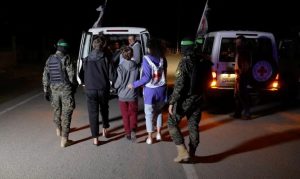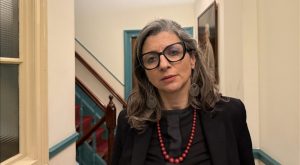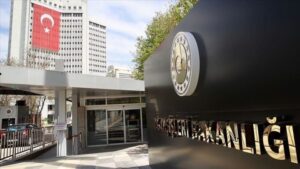 Cairo, 4 Sha’ban 1434/14 June 2013 (MINA) – A senior official in Egypt’s presidential office said that Egyptians are free to fight in the conflict in Syria, and will not be prosecuted on their return to Egypt.
Cairo, 4 Sha’ban 1434/14 June 2013 (MINA) – A senior official in Egypt’s presidential office said that Egyptians are free to fight in the conflict in Syria, and will not be prosecuted on their return to Egypt.
“The right of travel or freedom of travel is open for all Egyptians,” said Khaled El Qazzaz in a response to an Associated Press question Thursday (13/6) about the government’s stance on citizens going to fight alongside Syrian opposition, Ahram quoted by Mi’raj News Agency (MINA) as reporting.
El-Qazzaz, a foreign affairs adviser to Islamist President Mohamed Morsi, said the presidency does not consider Egyptian nationals in Syria to be a threat to Egypt’s security.
His comments come just days after influential Egyptian cleric Yusuf El-Qaradawi urged Sunni Muslims everywhere to join the fight against Syrian President Bashar Al-Assad, who is a member of the Alawite branch of Islam.
Also Read: US Revokes Terrorist Designation for Syrian Hayat Tahrir al-Sham
On Saturday Morsi will attend a conference on Syria in the International Conference Centre in Cairo’s Nasr City, the Muslim Brotherhood announced on Wednesday.
The conference is part of a Syria solidarity week organised by the Muslim Brotherhood and will include other influential figures such as El-Qaradawi and Saudi sheikh Mohamed Al-Arifi. The conference is scheduled to start on Thursday 13 June.
Egyptian jihadist’s path to Syria
Also Read: Israeli Airstrikes Hit Western Yemen Amid Rising Tensions
As the Syrian conflict grinds on, the mounting death toll has reduced many of the victims to faceless statistics, among them fighters from abroad drawn by a sense of religious duty. Here, BBC Arabic’s Khaled Ezeelarab tells the story of one such jihadist, and the path which took him from Cairo to the front lines against Bashar al-Assad.
Abubakr Moussa’s family is not quite what one would expect of a jihadist. The men are clean shaven, Abubakr’s father smokes and his sister wears the kind of headscarf worn by most Egyptian women.
A graduate from an English school in one of Cairo’s upper-middle-class suburbs, Abubakr did not become particularly religious until he entered university. It was then that he started growing his beard and spending a lot of time at the mosque.
When he graduated he refused to marry the young woman from a rich family chosen by his parents – instead he married a Russian widow from Chechnya whose brother he came to know at the mosque.
Also Read: Turkiye Denies $393.7 Million Export Claims to Israel, Calls Reports ‘Disinformation’
The woman already had two children and soon Abubakr was supporting all three, in addition to his new baby girl, Mariam.
‘Fighting for oppressed’
As much as he enjoyed the company of his new family he was nevertheless quite restless, says his 83-year-old father, Ibrahim.
“He felt he had an obligation to fight for oppressed Muslims anywhere,” he says.
Also Read: Turkish and Iranian Presidents Meet in Azerbaijan
And so it was that Abubakr flew to Russia hoping to make his way to Chechnya and join Islamist rebels there.
He failed and was sent back by Russian authorities. Shortly afterwards he was arrested by Egyptian police and detained for six months, and by the time he was released his wife had left him.
Abubakr remarried, this time to an Egyptian woman from a conservative religious family, and the couple settled at his parents’ house in the provincial town of Fayoum.
Perhaps not unexpectedly, given his history with the Egyptian authorities, he enthusiastically joined the uprising against Hosni Mubarak last year.
Also Read: Iran Reaffirms Commitment to Uranium Enrichment
But as the Arab Spring spread to other countries, Abubakr yearned to join the fight of other Muslims against their rulers.
He took part in a convoy to provide Libyan revolutionaries with humanitarian assistance. It is not clear if he joined in the actual fighting, and his parents say they do not know.
He also took part in a march towards the Israeli border with Egypt, in what was known at the time as the Third Intifada – a failed attempt by some Arab activists to cross into Israel and start the “liberation of Palestine”.
Syria calling
Also Read: Israel Breaks Ceasefire, Launch Deadly Strike on Lebanon
Then came Syria. Abubakr’s family insists he was not part of an organised campaign to send Islamist fighters to a holy war against Bashar al-Assad.
“He acted on his own, it was a personal initiative,” says his father.
Perhaps it was, but one of the last postings Abubakr put on his Facebook page before travelling to Syria, was an advertisement for a “relief convoy” organised by an ultra-orthodox Islamic group with contacts in Egypt and Lebanon.
Whether this relief convoy was a front for a fighters’ convoy is not clear, but in any case Abubakr made his way in March to Lebanon and from there to Syria where he joined the rebel Free Syrian Army (FSA).
Also Read: Prabowo, Prince MBS Call for Concrete Action to End Gaza Crisis
A comrade who met Abubakr in those first days of his Syrian venture told me that the Egyptian fighter quickly became known for his deep religious knowledge.
“He always led us in prayer,” he said. “He soon became famous among all the neighbouring battalions [of the FSA] and they would ask him to join them.”
Abubakr seems to have joined battles almost everywhere in Syria; he fought in Homs, al-Qasir, Damascus and Idlib.
It was from this last town that he wrote on Facebook on 31 August, telling his friends: “I am happy to inform you, brothers, that 17 thugs have been killed and 40 others injured in a unique operation carried out by your Mujahideen brothers.”
Also Read: Iranian Media Highlights Threat of New War, Calls for National Unity
It was his last posting. The following day he was killed, aged 35, in an attack by Syrian government forces.
His family is in grief but say they are not regretful.
“He has been seeking martyrdom for many years,” says his father, “now God has made him achieve his goal.” (T/P03/E1)
Mi’raj News Agency (MINA)
Also Read: Iranian FM Says Uranium Enrichment Technology Indestructible by Bombs





























 Mina Indonesia
Mina Indonesia Mina Arabic
Mina Arabic